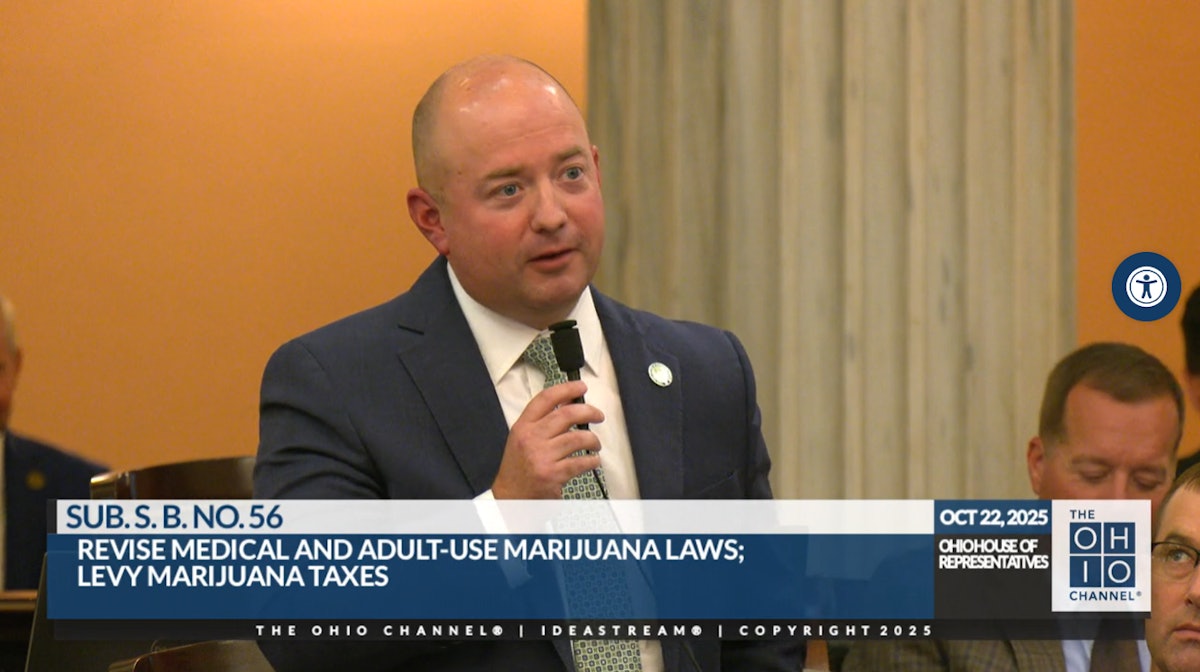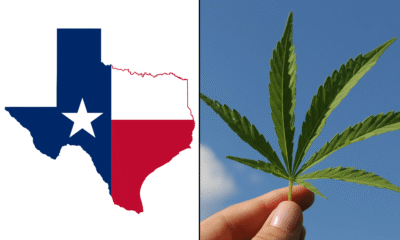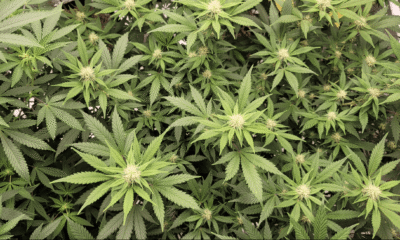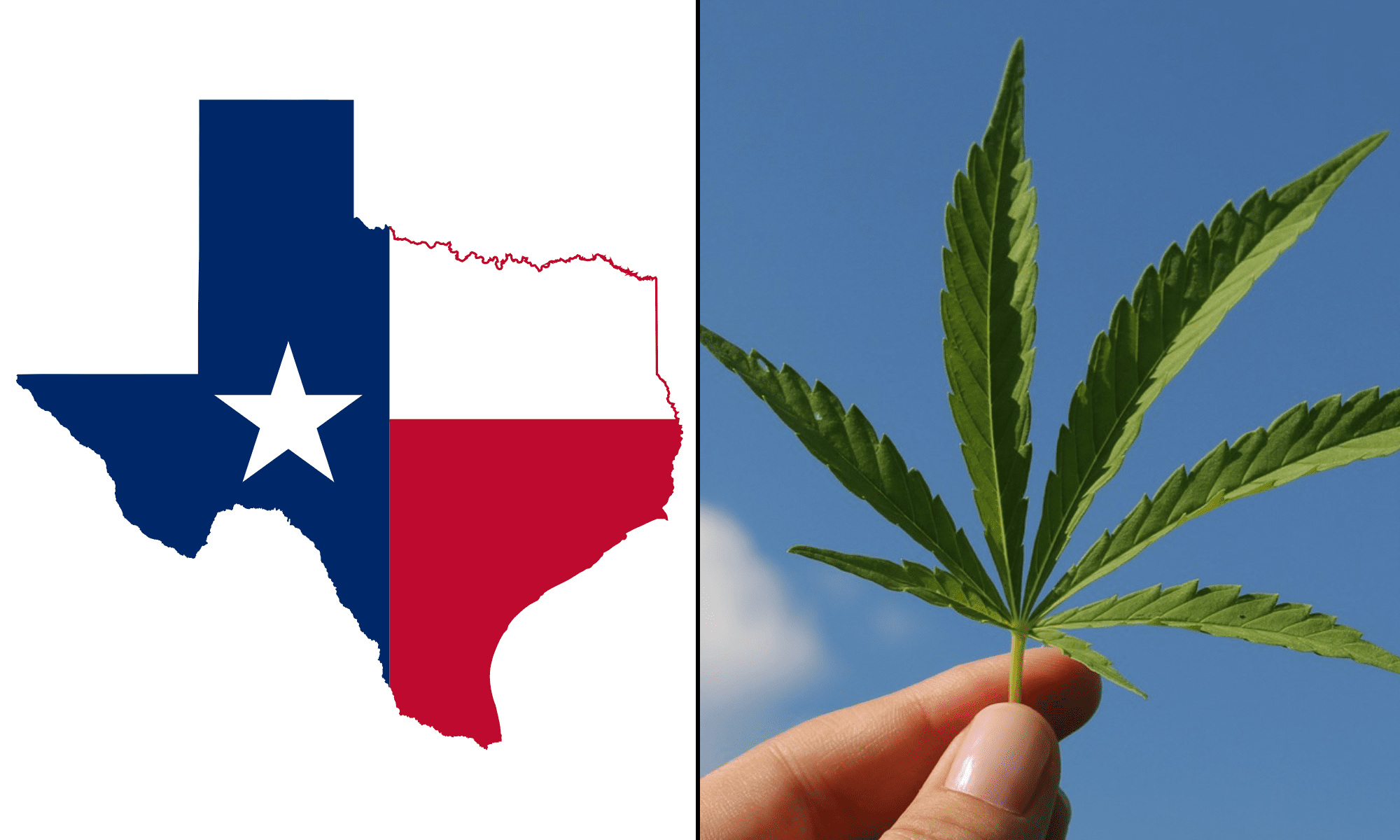featured
Ohio House Passes Cannabis, Hemp Bill Resulting From ‘Venn Diagram From Hell’
Published
15 hours agoon

Ohio House lawmakers passed the 18th version of a bill on Oct. 22 that aims to alter the state’s adult-use cannabis laws that voters approved in 2023, while also creating a tightly defined regulatory framework for hemp products.
The 228-page legislation, Substitute Senate Bill 56, preserves many aspects of the voter-approved initiative, such as home grows (six per adult or 12 per household), sharing between adults 21 and older, and allocating 36% of cannabis excise tax revenues to local municipalities that host dispensaries.
However, the bill would prohibit public consumption at places like music concerts and bar patios, and those caught with cannabis purchased outside the state would be criminalized. No other state where cannabis is legal imposes such restrictions on out-of-state purchases, according to cannabis advocacy group NORML.
In addition, while adults could continue to home cultivate cannabis under the legislation, they’d be restricted to harvesting more than 2.5 ounces of flower, or roughly one plant, with a felony penalty for those who grow more than the number of plants allowed. Also, the bill intends to place a 35% THC cap on flower and a 70% THC cap on extracts for both medical and adult-use cannabis.
“This isn’t what Ohioans voted for, and the fact that this bill is being rushed through the Legislature, with almost no opportunity for public comment, indicates that lawmakers know they are undermining the will of the voters,” NORML Political Director Morgan Fox said in a public statement. “Regardless of where one stands on cannabis issues, everyone should be outraged at this.”
The substitute bill found bipartisan House support in an 87-8 vote on Oct. 22.
Rep. Brian Stewart, R-Ashville, who carried Sub. S.B. 56 in the House, said Wednesday on the chamber floor that the bill “preserves all of the core aspects” of what voters passed two years ago, including access to tested and regulated products from licensed dispensaries.
Stewart also argued that the Legislature has to act to preserve the 36% tax revenue fund for host communities after the Ohio Department of Taxation flagged language in the voter-approved initiative, suggesting that the language failed to properly appropriate the money.
“It was always going to require legislation in this chamber,” he said.
The substitute bill also intends to establish a legal pathway for licensed “hemp dispensaries” to sell regulated and tested intoxicating hemp products, defined as containing more than 0.5 milligrams of delta-9 THC per serving or 2 milligrams per package, or more than 0.5 milligrams of total non-delta-9 THC per package. These sales would be limited to those 21 and older. Those who sell intoxicating hemp products to those under 21 would be guilty of a misdemeanor on the first offense and a felony on a subsequent offense.
Meanwhile, cannabinoid hemp beverages would be defined and regulated differently with a $1.20-per-gallon excise tax (more on this later).
Stewart said provisions included in the 18th version of the substitute bill resulted from a “Venn diagram from hell” that attempted to balance individual liberties, consumer safety, the financial well-being of local communities, and the “need to protect the health and safety” of Ohio children.
“If you’re reading through it and you’re saying, ‘Rep. Stewart, I don’t like Section X, I don’t like Section Y,’ please know you’re in good company. I don’t either,” he said. “This is not the bill that I originally introduced. It’s not the bill that Representative [Tex] Fischer originally introduced. But it is a carefully crafted compromise that makes Ohio better.”
While the Senate passed its version of the legislation in February, cannabis advocacy groups like the Marijuana Policy Project applauded the House Judiciary Committee for sitting on the legislation for nearly eight months as a means to prevent recriminalization measures “pushed by the Senate.”
However, many House members said during this week’s floor debate that Gov. Mike DeWine’s executive order issued Oct. 8 – one that attempts to shut down hemp-derived cannabinoid product sales and initiate emergency rulemaking – spurred lawmakers to go back to the drawing board for a legislative fix.
DeWine showcased various intoxicating hemp products in packaging that mimicked popular candies, like Nerds, Sour Patch Kids and Gushers, during his Oct. 8 press conference.
After lawmakers were at an impasse, DeWine’s executive order represented a turning point on Sub. S.B. 56, Rep. Tex Fischer, R-Boardman, said before Wednesday’s floor vote.
“I think we all had an agreement that that was not the intent of the hemp legislation at the federal level or here in Ohio, but we did need to do something to protect kids from these products,” he said. “Some of these products are truly illicit and truly dangerous, and everybody, no matter how fervent of an activist on the hemp side of this issue you were, agreed something needed to be done.”
Legislative disagreements had revolved around Ohio businesses that would be negatively impacted by language in previous versions of the bill, Fischer said.
Under the House-passed substitute bill, places where children “walk freely,” like gas stations and grocery stores, would be prohibited from selling intoxicating hemp products, while certain intoxicating hemp retailers, such as a qualifying vape shop, would be “grandfathered in” for licensure.
For a retailer to qualify for a grandfathered-in hemp dispensary license, that retailer must have sold intoxicating hemp products on or before Aug. 30, and the store’s receipts from hemp and intoxicating hemp product sales must have exceeded 80% of its total gross receipts for either the past 12 months or the 2024 calendar year.
“What about those people that have poured their blood, sweat, tears, years of work, potentially millions of dollars into building a business living by the rules that we set out, whether they were adequate or not, they were not breaking the law,” Fischer said. “Those were the people that I was motivated to stand up for, and while this bill doesn’t do everything that I wanted or everything that others want, I believe we have arrived at a reasonable conclusion to allow those people to still stay in business, to grandfather them into this new regulatory regime.”
No one under the age of 21 would be allowed inside these hemp dispensaries, which would be prohibited from selling cigarettes, tobacco, and vape or electronic smoking products under the bill. No more than 400 hemp dispensaries would be allowed in the state, unless those grandfathered in exceed that number.
While the biennial license renewal fee for Ohio’s cannabis dispensaries is $70,000, the two-year renewal license fee for a grandfathered-in hemp dispensary would be $35,000 under Sub. S.B. 56.
Meanwhile, hemp beverages, which the substitute bill defines as “drinkable cannabinoid products,” would be regulated differently. In addition, these products would be classified as low-level DCPs (5 milligrams or less of total THC per serving) or high-level DCPs (5-10 milligrams of total THC per serving). Only one serving per container would be allowed.
Neither low-level nor high-level DCPs would constitute an “intoxicating hemp product,” with DCPs falling under a separate regulatory framework for manufacturers, distributors and retailers. Still, sales to those under 21 would be prohibited.
Ohio retailers with Class C liquor licenses, such as grocery stores that sell alcohol for carryout only, would be allowed to sell high-level DCPs. Meanwhile, Ohio retailers with licenses for on-site consumption, such as restaurants and bars, would be allowed to sell low-level DCPs.
While the substitute bill would allow DCP manufacturers to create higher-dose beverages that contain more than 10 milligrams of THC, they would be restricted to distributing and/or selling those products to out-of-state partners.
Fischer said there were a lot of wins “for us so-called ‘hemp-resentatives,’” in the substitute bill.
“Many of you heard from beverage manufacturers, bars, restaurants, retailers about how popular these products are, but there are also a lot of folks that weren’t yet comfortable stocking these products because of the regulatory uncertainty that is a result of our inability to previously come to an agreement here in Columbus,” he said. “I think this strikes the appropriate tone of a reasonable, fair and pro-business regulatory regime while still maintaining that these products and consumers should be safe.”
While it’s unclear if the Senate will agree to the House’s amended substitute bill or take the legislation to a conference committee for further debate – before possibly sending the bill to DeWine’s desk – the potential outcomes are significant for Ohio stakeholders: cannabis businesses, hemp businesses, consumers, patients and children.
Rep. Jamie Callender, R-Concord, a long-time advocate for cannabis reform in the Buckeye State, acknowledged the legislation “is not perfect” before voting to support the bill.
Callender said a “no” vote on the legislation represents allowing retailers to continue selling high-THC products to children walking home from schools with impunity.
“I imagine everybody in this room can find at least one thing they don’t like in the bill, one thing they think can be improved on,” he said. “You have my commitment. I’ll keep working with everyone to make it better, but I believe we have to act.”

Author: mscannabiz.com
MScannaBIZ for all you Mississippi Cannabis News and Information.
You may like
-


Unexpected Pleasures of Weed: The Strain That Turned My Husband Into a Clean Freak
-


Texas Officials Adopt Rules To Expand Number Of Medical Marijuana Dispensaries In the State
-


Cannabis Ventures, Start-Up Best Practices, and Ways to Compete
-


Older Adults Increasingly Identify as Cannabis Consumers
-


Kentucky Governor Touts Surge In Medical Marijuana Patient And Business Approvals As State Prepares For Program Launch
-


SCOTUS cannabis & guns case gets delay request (Newsletter: October 24, 2025)
featured
Unexpected Pleasures of Weed: The Strain That Turned My Husband Into a Clean Freak
Published
21 minutes agoon
October 24, 2025
Dan and I have been married for over 20 years, and we have always maintained a very simple domestic arrangement. He does all the cooking: the three usual meals, plus a 9 pm bonus one, and I do the dishes. This has always been assumed and has always worked for us.
That is, until one day when I went to clean up and the kitchen was spotless. All the dishes, including the ones from the 9 pm fourth meal of the day, were washed and dried. The pots and pans sparkled. The countertops were wiped with purpose.
And what, you may ask, prompted him to change out his routine? Blue Dream.
Compulsive cleaning, like Dan’s need to do the dishes, is a known anecdotal effect of cannabis use, especially with sativa-dominant strains like Blue Dream. The effect is usually temporary and passes as the high wears off, which, for inhaling, typically lasts 2 to 3 hours.
However, I needed some scientific background on how this works, so I emailed my friend Dani Fontaine, an Endocannabinoidologist and NeuroTherapist and asked her this simple question: Why does my husband do the dishes, like he has OCD, after Blue Dream?
“It’s the combination of the terpenes and the terpene ratios, which include Myrcene, Pinene, and BCP (b-caryophyllene),” she said. Okay, it seems simple. She continued: “The terpene combination of a true Blue Dream strain enhances dopamine transmission in the mesolimbic reward pathway. THC activates the CB1 receptors in the prefrontal cortex and basal ganglia, which is the space that modulates dopamine release from the VTA (ventral tegmental area).”
However, she says, you need to take into account someone’s DNA. “I would say that the above is what the majority of human bodies feel,” she continues, “but if your DNA is composed with certain markers, it can give someone a different experience due to how the terpenes and cannabinoids are digesting in the system.”
Here’s where it gets interesting. Normally, Anandamide can balance out and fine-tune the start and stop actions of repetitive and habitual behaviors, but when someone consumes THC, it shuts off Anandamide production as THC is a stronger signal that can override the natural “off switch.” Some people can’t digest THC, though. (We need the enzyme in order to break it down properly and lots of use over time makes it harder to naturally produce the breakdown.) This would put someone into a loop cycle a bit heavier due to not being able to digest the compound.
As the THC starts to metabolize, CB1 receptors downregulate. This is when the “burnt” feeling starts creeping in due to our neurochemicals that push us into a space of contentment or a parasympathetic state (freeze/fawn/rest/digest). She finishes: Cannabis in general lowers amygdala reactivity and can dissolve anxiety boundaries, which also puts people in a state of calm production.
Now I can see how excessive cleanliness can be a passion, and only considered a disorder (OCD) when it becomes distressing, time-consuming, or significantly disruptive to daily life. For now, I simply love our new working relationship.
Cover image made with AI

Author: mscannabiz.com
MScannaBIZ for all you Mississippi Cannabis News and Information.
featured
Texas Officials Adopt Rules To Expand Number Of Medical Marijuana Dispensaries In the State
Published
1 hour agoon
October 24, 2025
Texas officials have formally adopted new rules to implement a law significantly expanding the state’s medical marijuana program.
About two months after the Department of Public Safety (DPS) posted the proposed rules—after which point a 30-day public comment period was completed—the regulations were finalized and published in the Texas Register on Friday.
This specific set of rules will increase the number of licensed dispensaries, establish security requirements for “satellite” locations and authorize the revocation of licenses for certain violations.
DPS will ultimately be issuing 12 new licenses for dispensaries across the state. Currently there are only three. The additional licensees will go through a competitive process, with officials prioritizing Texas’s public health regions to optimize access.
The first round of licenses will be awarded to nine of 139 applicants who submitted their forms during an earlier application window in 2023. DPS will select those nine licensees on December 1. The 2023 applicants that didn’t receive a license, as well as any new prospective licensees, will have another shot at getting their license during a second round where awardees will be announced on April 1, 2026.
The finalized rules also lay out security parameters for dispensaries with satellite locations approved by the department, including mandates to “designate an enclosed locked area within the satellite location where low-THC cannabis product is stored that provides reasonably adequate security against theft and diversion” as well as “designate an individual, or a limited number of individuals, with responsibility for and with the authority to enter or control entry” into those secure areas.
Additionally, they specify policies allowing regulators to revoke licenses for violations such as not having cannabis products available within 24 months of a license issuance, failing to “promptly and accurately fill prescriptions” and not “continuously” producing cannabis “in a manner consistent with the level of demand for the licensee’s product.”
DPS received two comments on the rules when they were up for public review, but no changes were made based on the feedback.
In addition to increasing the number of dispensaries in the state, the law signed by the governor also expands the state’s list of medical cannabis qualifying conditions to include chronic pain, traumatic brain injury (TBI), Crohn’s disease and other inflammatory bowel diseases, while also allowing end-of-life patients in palliative or hospice care to use marijuana.
That policy change is automatically adopted via the enacted statute, so it took effect on September 1 without further rulemaking.
Also in line with the state’s medical cannabis expansion law that Gov. Greg Abbott (R) signed, the state Health and Human Services Commission (HHSC) proposed rules last month to let physicians recommend new qualifying conditions for cannabis and to create standards for allowable inhalation devices.
—
Marijuana Moment is tracking hundreds of cannabis, psychedelics and drug policy bills in state legislatures and Congress this year. Patreon supporters pledging at least $25/month get access to our interactive maps, charts and hearing calendar so they don’t miss any developments.![]()
Learn more about our marijuana bill tracker and become a supporter on Patreon to get access.
—
Meanwhile, Department of State Health Services (DSHS) recently adopted a set of emergency rules meant to prevent the sale of intoxicating hemp products to people under 21.
After similar restrictions were implemented by the Texas Alcoholic Beverage Commission (TABC) late last month, DSHS announced that they’ve moved forward with the policies changes that comply with the governor’s recent executive order on hemp.
Meanwhile this month, the head of the Texas Department of Agriculture (TDA) pushed back against a GOP senator’s “incorrect assertions” about the state’s regulatory compliance with federal hemp laws. But he also signaled that changes may be coming to measure “total THC” to determine the legality of hemp products in a way that some stakeholders worry could negatively impact the industry.
After the legislature failed to pass a controversial bill to ban hemp products containing THC during two special sessions following the governor’s veto of a similar measure earlier this year, Abbott signed the executive order to impose certain restrictions on the market.
Separately, a recent survey from a GOP pollster affiliated with President Donald Trump found that Texas Democratic and Republican voters are unified in their opposition to the hemp ban proposal.
Image element courtesy of AnonMoos.

Author: mscannabiz.com
MScannaBIZ for all you Mississippi Cannabis News and Information.
featured
Cannabis Ventures, Start-Up Best Practices, and Ways to Compete
Published
2 hours agoon
October 24, 2025
Once relatively easy to break into, the cannabis industry now demands a leaner and more conservative approach to financial management, along with precise forecasting and a great deal of patience. There are inherent risks, regulatory uncertainties, and financial challenges faced by new market entrants and established operators alike. As the market continues to mature, so will your needs and approach.
Let’s take a look at some best practices for cannabis business start-ups within today’s landscape.
Structure, Build-Out, and Expectations
First, consult with your attorney and CPA regarding the type of business you’ll run in the context of the overall market. Will you be operating a cannabis dispensary or manufacturing entity? Are you a cultivator or a delivery service? Will you be vertically integrated?
While you might have a general idea of the structure for your business, financial and legal guidance on related taxation and liability can help refine your strategy to ensure the most profitable and sustainable operations.
As you map your entry into the cannabis space, you’ll first want to invest in some market analysis. Your market analysis should include research and data on market size, licensing policies of your particular municipality/state, competition, growth potential, and consumer preferences.
For retail, it should define the relevant population of your chosen market and provide insights into buying behavior for that demographic, the median household income, and the type of dispensary population growth that has occurred within a 5-, 10-, and 15-mile radius. For wholesale, consider strains, competition, and market saturation.
In addition to a market analysis, a start-up will need accurate cash flow projections, which should include revenue assumptions and financing, along with your timeline. If possible, benchmark assumptions against others in your particular market.
With the market analysis in hand, you can develop revenue projections. Consider your potential monthly purchaser base and its estimated spend. Of customer spend, what would be a realistic product breakdown? How do your intended SKUs compare with your competitors?
Finally, build detailed expense assumptions that include everything from furniture and fixtures to staffing, advertising, construction and renovation, professional services, taxes, facility maintenance, insurance, security, IT, and utilities. Keep in mind that the most successful start-ups are taking a cautious and conservative approach to their build-outs and are properly capturing costs to ensure they meet day-to-day business obligations.
Data and KPIs
Like all businesses, cannabis operations need to consistently capture data and maintain good books. Data capture can be conducted through technologies, including your inventory tracking, point of sale, accounting, and accounts payable systems. This process can then be systematized to provide the reports and analytics you need to monitor trends on the fly.
Next, identify Key Performance Indicators, or KPIs, and track their performance along with budget to actual on a post-build-out and ongoing basis. Ask yourself, do we have a realistic forecast that we could continually reassess? Solid preoperational numbers and forecasts are critical both at the point of operation and at set milestones, such as the first six, 18, and 24 months. This helps not only to refine business strategy but also to answer your investors when asked for a realistic breakeven point.
Data is crucial during the preoperational phase because it drives accurate management assumptions. It will also be critical in managing investor expectations. Consider one seemingly simple decision for a retail operator: Do we need a 1,000- or 10,000-square-foot store?
From this, you will need to determine how much of that space would be committed to sales, which may not be tax-deductible, and to inventory storage, which may be tax-deductible. Once you decide this, you will need to determine the number of employees required to run lean yet profitable operations.
Under these circumstances, what would be your estimated build-out costs? How much would you pay for rent? What’s the timing of various cash flows? Only with accurate data could you make the right determinations and measure the success of those decisions over time.
Using your initial data markers, you can then build out scenarios that allow you to visualize various options. For instance, see how results would look assuming a high-, mid-, and low-revenue operation. Likewise, you could model results under a high-salary/low-revenue versus a low-salary/high-revenue projection, as well as model against available benchmarks.
Note that if you have multiple lines of business, some of your data points will correlate. So, a combined dispensary and delivery business, for instance, could enjoy greater efficiencies. As you build out your plan, look closely for potential opportunities.
Another area where data is essential is inventory management and your business strategy around that. Use data to determine your best-selling strains, for instance, or those offering the greatest net margin potential. Keep in mind that, while one strain might be popular with consumers, the benefits to producing it could come at a price. So, evaluate whether it works to your advantage to continue with production or pivot to a less expensive strain.

Author: mscannabiz.com
MScannaBIZ for all you Mississippi Cannabis News and Information.

Unexpected Pleasures of Weed: The Strain That Turned My Husband Into a Clean Freak

Texas Officials Adopt Rules To Expand Number Of Medical Marijuana Dispensaries In the State

Cannabis Ventures, Start-Up Best Practices, and Ways to Compete

Older Adults Increasingly Identify as Cannabis Consumers

Kentucky Governor Touts Surge In Medical Marijuana Patient And Business Approvals As State Prepares For Program Launch

SCOTUS cannabis & guns case gets delay request (Newsletter: October 24, 2025)

Ohio House Passes Cannabis, Hemp Bill Resulting From ‘Venn Diagram From Hell’

What To Know About Cannabis And A Brain Aneurysm

MariMed to Expand Brand Distribution to New York

Time for a Cannabis Reboot: Local Roots, Fair Markets, Real Change

Ohio Health Agency Grants $400,000 To Fund Psychedelics Education And Training For First Responders, Doctors And More

Curio Wellness Acquires 4 Greenlight Dispensaries in Missouri

The best places to be high in Seattle

Colombia’s Bold Offer to Trump: Legal Weed Exports for Peace

Trump DOJ Asks Supreme Court For Delayed Schedule In Case On Marijuana Users’ Gun Rights

Whiskey Company Scales Back Operations, Citing ‘Consumer Shifts’ Toward Marijuana As Alcohol Alternative

Smart Cannabis: The AI Revolution No Operator Can Ignore

New Jersey Gubernatorial Candidates Need To Step Up For Cannabis Consumers (Op-Ed)

Millennials Are Spending Big on Luxury Travel

West Virginia Medical Marijuana Revenue Is Supposed To Support Drug Treatment Programs, But Sits Unspent As Officials Worry About Federal Prohibition

Frequent Marijuana Use Is Tied To Lower Risk Of Liver Disease From Alcohol, New Study Finds

Ohio bill to scale back cannabis legalization passed by House (Newsletter: October 23, 2025)

FDA Weighs Petition On ‘Significant Harm’ Of Marijuana Hair Testing Device’s Positive Results From Secondhand Smoke

Wisconsin Lawmakers Rally for Medical Cannabis Legalization in Committee Hearing

Alert: Department of Cannabis Control updates data dashboards with full data for 2023

Connecticut Appoints The US’s First Cannabis Ombudsperson – Yes there is a pun in there and I’m Sure Erin Kirk Is Going To Hear It More Than Once!

5 best CBD creams of 2024 by Leafly

Recreational cannabis on ballot for third time in South Dakota

EU initiative begins bid to open access to psychedelic therapies
New Study Analyzes the Effects of THCV, CBD on Weight Loss

Free delta-9 gummies from Bay Smokes

5 best autoflower seed banks of 2024 by Leafly

Discover New York’s dankest cannabis brands [September 2024]

Press Release: CANNRA Calls for Farm Bill to Clarify Existing State Authority to Regulate Hemp Products

May 2024 Leafly HighLight: Pink Runtz strain

5 best THC drinks of 2024 by Leafly

Local medical cannabis dispensary reacts to MSDH pulling Rapid Analytics License – WLBT

6 best CBD gummies of 2024 by Leafly

Curaleaf Start Process Of Getting Their Claws Into The UK’s National Health System – With Former MP (Resigned Today 30/5/24) As The Front Man

Horn Lake denies cannabis dispensary request to allow sale of drug paraphernalia and Sunday sales | News

5 best delta-9 THC gummies of 2024 by Leafly

The Daily Hit: October 2, 2024

Mississippi city official pleads guilty to selling fake CBD products

Nevada CCB to Accept Applications for Cannabis Establishments in White Pine County – “Only one cultivation and one production license will be awarded in White Pine County”

Weekly Update: Monday, May 13, 2024 including, New Guide for Renewals & May Board meeting application deadline

5 best THCA flower of 2024 by Leafly

6 best hemp pre-rolls of 2024 by Leafly

PRESS RELEASE : Justice Department Submits Proposed Regulation to Reschedule Marijuana
Trending
-

 California Cannabis Updates1 year ago
California Cannabis Updates1 year agoAlert: Department of Cannabis Control updates data dashboards with full data for 2023
-

 Breaking News1 year ago
Breaking News1 year agoConnecticut Appoints The US’s First Cannabis Ombudsperson – Yes there is a pun in there and I’m Sure Erin Kirk Is Going To Hear It More Than Once!
-

 best list1 year ago
best list1 year ago5 best CBD creams of 2024 by Leafly
-

 Business1 year ago
Business1 year agoRecreational cannabis on ballot for third time in South Dakota
-

 Business1 year ago
Business1 year agoEU initiative begins bid to open access to psychedelic therapies
-

 cbd1 year ago
cbd1 year agoNew Study Analyzes the Effects of THCV, CBD on Weight Loss
-

 Bay Smokes1 year ago
Bay Smokes1 year agoFree delta-9 gummies from Bay Smokes
-

 autoflower seeds1 year ago
autoflower seeds1 year ago5 best autoflower seed banks of 2024 by Leafly



